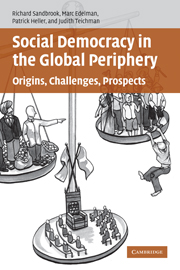7 - Social and political origins
Published online by Cambridge University Press: 22 September 2009
Summary
Each of our four cases evokes claims of exceptionalism. Mauritius is often described as a “miracle,” Kerala as a “model,” Costa Rica as the “Switzerland of Central America,” and Chile as the “tiger” of Latin America. When examined individually, the contingencies of history, social or cultural particularities, and visionary leadership naturally carry much of the explanatory weight. But when viewed comparatively, a general type emerges. In all four cases democratic institutions have allowed for the effective expression of subordinate-class interests and resulted in patterns of development that are remarkably equitable by regional standards – albeit with a more discontinuous and inegalitarian pattern in Chile. The fact that our cases (and others) share such a strong resemblance to each other while being so different from their neighbors points to something more than just accident or idiosyncrasy at work. These are, in effect, exceptionalisms of a general type and suggest a homology – a common causal history. This chapter explores this homology by teasing out the necessary historical conditions and processes that underwrite trajectories of social-democratic development.
To make sense of these exceptionalisms of a general type, they need to be grasped from different levels of analysis that move from the most general causal variables to the most proximate. We develop our analysis and argument at three levels. We first demonstrate that all of our cases share the same long-term structural properties of having been integrated early and deeply into the global capitalist economy.
- Type
- Chapter
- Information
- Social Democracy in the Global PeripheryOrigins, Challenges, Prospects, pp. 177 - 211Publisher: Cambridge University PressPrint publication year: 2007

